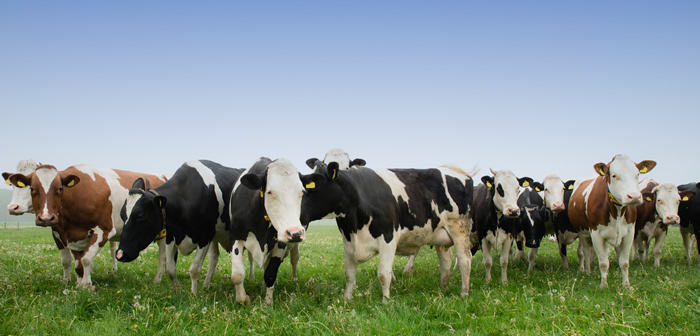Merial is advising farmers in the Western regions of the UK to remain vigilant for outbreaks of liver fluke disease in sheep and cattle, as the latest NADIS Parasite Forecast predicts a high risk period this autumn.
Liver Fluke was a major disease problem in western regions of the UK over the winter months of 2015. The combination of wet conditions and previous pasture contamination has resulted in a ‘high risk’ of liver fluke disease this year in western regions of Scotland, Wales, and North-West England, however Central and Eastern regions are forecast at low risk.
Sioned Timothy, Veterinary Advisor at Merial Animal Health says: “Preventative treatment for acute liver fluke disease in sheep will almost certainly be required in Scotland, Wales and North-West England.”
“In these circumstances triclabendazole is the most appropriate choice of treatment. It is the only product effective against the early immature stage of fluke which causes acute disease. Triclabendazole should be used to target immature fluke, but alternative products can be used outside the acute fluke risk period. Later fluke treatments (November/December onwards) could include either closantel or nitroxynil (Trodax). Any farmers concerned about the use of triclabendazole and potential resistance should consult their vet for advice.”
Adopting evasion strategies such as avoiding high-risk grazing including fields known to be contaminated by the parasite and poorly-drained ground, can reduce the incidence of acute fluke in sheep, especially if combined with an effective treatment plan.
Where disease does occur, affected sheep may simply be found dead following exposure to a sudden and high fluke challenge. Post-mortem examination of these cases will confirm the diagnosis and allow for measures to be put in place to protect the rest of the flock. Less severe signs include reduced grazing, rapid weight loss, weakness, abdominal pain and anaemia.
When treating sheep, farmers should split heavier and lighter animals into groups and weigh a representative sample to dose accordingly. Under-dosing will reduce the efficacy of flukicides, but care must be also taken not to over-dose.
“Cattle will also be at risk of fluke infection this autumn though do not typically suffer from the effects of acute fluke.” says Ms. Timothy. “We suggest that farmers consider the use of alternative flukicides such as nitroxynil (Trodax) which is effective against late immature and mature fluke, or clorsulon (included in IVOMEC Super),which is effective against mature fluke. By the time of housing these later stages will predominate within the host; effective removal of the parasite as soon as cattle come in will reduce the risk of clinical disease and production losses over the winter. Advice on product choice and optimal timing of treatments should be sought from a vet or SQP (Suitable Qualified Person).”
“As these products may leave low numbers of early immature fluke untreated, cattle should be checked for the presence of fluke eight to twelve weeks after treatment, depending on the product used, and dosed again if required. Meat-withholding periods should also be observed before treatment.” says Ms. Timothy.
She continues: “Removing fluke from cattle during the housing period means animals can make the most of winter feed and are less likely to experience checks in growth. Then, when they are turned-out in the spring they won’t immediately re-contaminate the pasture with fluke eggs. It’s a win-win situation.”
Young cattle, particularly those in their first or second grazing season, may be at risk of parasitic gastroenteritis, type 1 ostertagiosis, caused by large numbers of gutworm (Ostertagia ostertagi) picked up from pasture over the summer, particularly if worm control measures where not implemented earlier in the season to minimise pasture larvae contamination. Early signs of disease include profuse diarrhea which can lead to rapid weight loss if not treated promptly.
A housing treatment with a suitable wormer should be considered as young cattle will have picked up gutworm burdens during the grazing season, even if cases of clinical disease have not been seen. Untreated, worms will affect productivity over the housing period, and, heavy burdens may result in outbreaks of type 2 ostertagiosis later in the winter, causing severe scouring and sometimes death.
Products containing ivermectin (such as IVOMEC Classic) or eprinomectin (such as EPRINEX for dairy cows) are effective against all stages of gutworm and against external parasites. Combination products are also available, such as such as IVOMEC Super (containing ivermectin and clorsulon) which is effective against gutworm, the adult stages of fluke and external parasites. Advice on the most appropriate product to use should be obtained from a vet or SQP.
Quarantine is a vital element of a robust parasite control programme. Ms. Timothy stresses that bought-in breeding stock present a high risk to a farm’s parasite status and could bring a range of worms and fluke onto farm including resistant strains.
She says: “All farms must maintain their biosecurity to protect their health status, and prevent the introduction of disease threats including parasites along with new animals. Rigorous implementation of a quarantine protocol, developed in conjunction with a vet, will minimise the risk of new parasites and resistant strains being brought onto the farm.”


